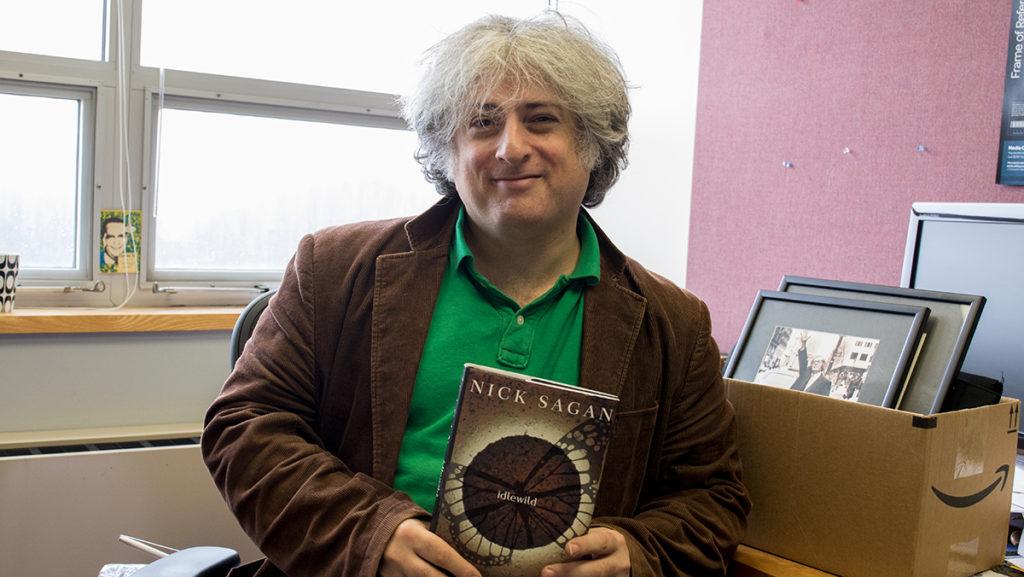Before Ithaca College instructor Nick Sagan was writing novels, screenplays and episodes for “Star Trek,” his voice was recorded for the Voyager Golden Record, a phonograph that was aboard the 1977 Voyager spaceship. His father, Carl Sagan — Cornell professor, accredited astronomer and one of the most famous scientists of the 1980s — played a role in launching his son’s greeting into the stars.
As a young New Yorker with divorced parents, Nick didn’t know what career path he would follow until he moved to California. After a friend suggested he watch the television show, “The Prisoner,” Nick discovered he wanted to work in the film industry, as he was fascinated by the many roles that an individual could take on while working on set — whether that be writing, directing or editing.
He passed the California High School Proficiency Exam — the California equivalent of the General Education Development (GED) exam — dropped out of high school and enrolled in Santa Monica College. He transferred to UCLA Film School and graduated summa cum laude.
Nick currently teaches writing for screen media and structuring the feature film at Ithaca College. Both courses will be offered this fall.
Staff Writer Brianna Ruback spoke with Nick about his writing experiences, his rise to success in the television industry and the impact his father had on his life.
This interview has been edited for length and clarity.
Brianna Ruback: Where do you derive your inspiration for your novels and screenplays?
Nick Sagan: First thing I would say is that so much of any creative person’s decision-making is powered by the unconscious mind. In my case, I think a lot of the time, it’s just questions like … “What if?” or “How come?” or “Why isn’t there…?” — just that kind of possibility. For me, my passion is science fiction, but it’s not hard science fiction, so to speak. I’m not so interested in the actual science behind how a warp engine would work. … I’m more interested in social science fiction. I’m interested in, you know, the big questions that we [can’t] think to answer.
BR: Do you repel your interests away from anything astronomy or science-related because of your father’s credibility as a scientist?
NS: Everyone looks to find their own path — but you’re also the product of where you come from. … For me, my father is a scientist. My mother is an intelligent writer and an artist. And so, I think I’m synthesizing aspects of what they both did best.
BR: How were your experiences growing up different from a typical child because your father was well-known in the science world?
NS: Very different. I didn’t realize it at the time, of course. It seemed very normal to me … I’d like to think it was a very “Jonny Quest” upbringing, except not archaeology, but more science. My mother would throw dinner parties and famous scientists and science fiction writers would come to those parties … Isaac Asimov would come to dinner parties and Ray Bradbury. … I would sneak down [from my room] to see what was going on past my bedtime and stuff. … I would go to rocket launches. And there was always some weirdness … I would go to school and in science classes, they would show episodes of “Cosmos” — like, that’s my dad, on TV, in my class. I was a little kid when they sent the Voyager. … And so, my parents … tried to get greetings from every language they could find. They needed an English speaker and they wanted one of the voices to be a child. And so, they invited me. “Hey Nick, what would you say to extraterrestrials if they’re out there?” And so I said, “Hello from the children of planet Earth.” And that’s on the Voyager Golden Record and it’s just now the farthest human-made object in the universe.
BR: What was the biggest impact that your father had on your life and your career?
NS: He was the best teacher I ever had and from a very early age. And so, you know, you’re a kid and you ask your parents questions, like why is the sky blue, you know? And a lot of parents will say, “Look it up,” or “Shut up, don’t bother me.” And my dad was always willing to engage and tell me what he knew and he would explain things … And it was that kind of just, you know, endless … sweetness, and … sense of possibility that I think was hugely influential on me as a child that kind of set me on my path.
BR: Have you ever worked alongside him?
NS: I never really got a chance to do that. He passed away when I was 26, sadly. It’s one of the things I wish I had a chance to do. I’m very lucky that the extent of my personal career was just taking off while he was still alive in his later years.
BR: What inspired you to teach?
NS: There’s something enormously rewarding about inspiring people, about telling them something and you see that that’s something they hadn’t considered before, and it leaves them different for the experience — and hopefully, better for it. And you see them, kind of, they are able to take that skill and then go off and create something with it. … It’s been a very rewarding experience teaching here at IC particularly. I’ve taught at Cornell before. I taught at some other colleges back in California, but I really like this place in particular.














